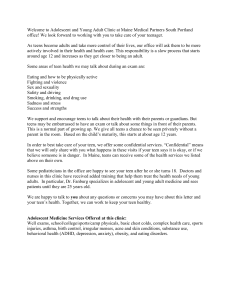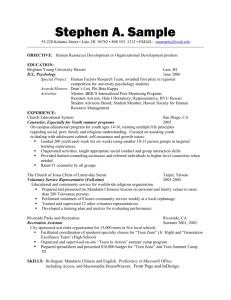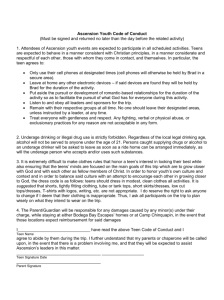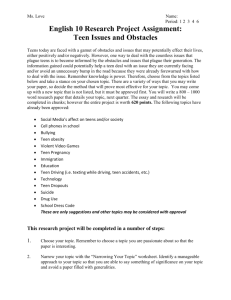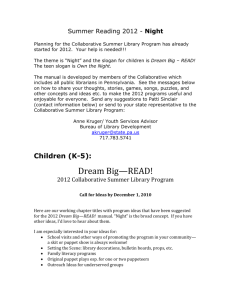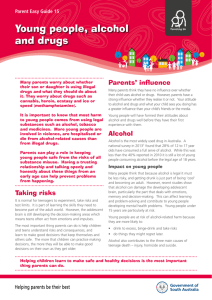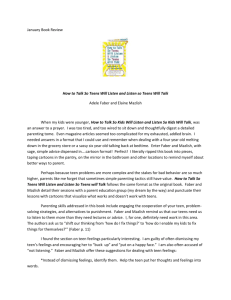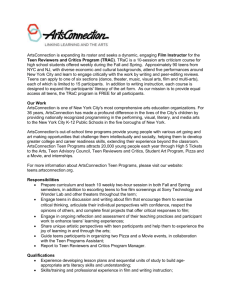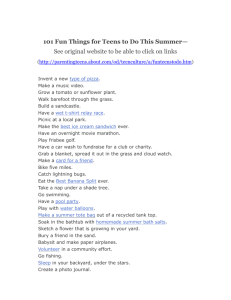Big engine
advertisement
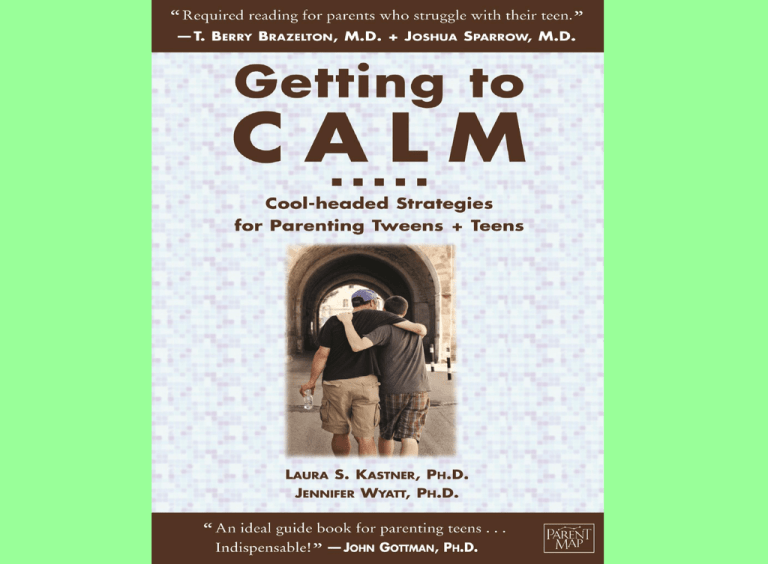
The Thinking Brain Emotional Brain Teen Brain NASCAR Metaphor • Big engine—maturing bodies, independence-striving • Poor Driver—immature PFC and judgment • Faulty Break system—immature inhibitory mechanisms in PFC • High octane fuel—hormones Executive Functioning: The CEO • Planning ahead, goal setting and analysis • Reasoning/Judgment- weighing the costs, benefits and risks of various options • Impulse control What happens at age 13? • Up to half of the neural branches in the thinking brain are sloughed off (pruning) • Over the next ten years, new brain growth occurs (blossoming) • The neurons that fire together wire together (what you do and think and experience determines brain growth) • Hard wiring of genetics and soft wiring of experience interact to determine outcome Take home message for parents * During the remodeling of the prefrontal cortex adolescence, behavior is often governed more by the emotional centers of the brain than the thinking part of the brain, especially in contexts of high arousal and peer presence. * Teens of wholesome, authoritative and high functioning parents have moodiness, reactivity and impulsivity due to brain and hormone changes. Given the “norms” for teen challenges, what’s a parent to do? • Accept teen moodiness, emotional reactivity and risk-taking (dumb mistakes) • Develop excellent personal emotional regulation skills in order to manage teen’s intense reactions (self calming) • Choose productive parenting approaches to optimize learning opportunities for the teen “Art of the Debrief “ Technique • Before the debriefing session, let him know that you want him to present his story of what happened with honesty, reflection and critical analysis. What are ways that careful thinking could help him avoid such problems in the future? • The quality of this self-analysis and the degree to which he genuinely engages in a respectful interchange will help determine your decisionmaking about disciplinary actions. • The meeting will be discontinued if negative emotions derail respectful and productive interchange. Authoritative Parenting Style • High warmth, thoughtful authority, effective communication • Effective communication requires a calm mind to access a wise mind • Discipline is effective only in the context of a mostly positive relationship • Parents are most effective when they are united, clear and confident C.A.L.M. technique (for meltdowns) • C Cool down: Self-soothe; don’t talk; control yourself, without trying to control anyone else. Slow breathing (Reset, Re-boot). • A Assess options: What are the issues? Would it be better to keep talking or postpone? Weigh the costs/benefits/risks of options. Engage your own prefrontal cortex with this analysis. • L Listen with empathy: When re-engaging with teens, ALWAYS start with empathy—without any “buts”. Appreciating another’s feelings does not have to mean approval or agreement. • M Make a plan: Consider ways to move forward. What are issues with your teen that you might want to address in the big picture? . Avoiding arguments, power struggles and the “paper lion” parent trap 1. State your expectation 2. Don’t fall for “the bait” of resistive protests and give the child room for choosing to cooperate 3. Allow ONE reminder Early in childhood, children should be informed that they will receive consequences for non-compliance. Parents should invest in controlling their children’s conduct, not their thoughts and feelings. When kids non-comply or resist, DON’T A.R.G.U.E. • • • • • Advise/preach/lecture Repeat yourself/nag Get them to agree or accept your side Ultimatums or threats Explain/defend policy at the time of conflict When kids resist, defy or try to engage in a power struggle, consider: • Using the C.A.L.M. technique for meltdowns • The only person you can control is yourself • Ask yourself: You might be right, but are you effective? • “My child is doing the best she can right now, given her emotional state.” • Respond skillfully to your child’s emotional needs, “not the content issue.” • Use artful one-liners Stresses of hyper-parenting, overscheduled, and over-pressured parenting • Suburban sample of middle school children compared to an inner city sample • Significantly higher levels of depression, anxiety and substance use • Strongest predictor of symptoms was perceived academic pressure from parents and isolation from parents. Luthar, S. and Becker, B. Privileged but Pressured? A Study of Affluent Youth. Child Development, 2002, 73 (5), 1593-1610. A checklist for parents of tweens (all in book) • • • • • • • • • • • Control media and electronic use and avoid giving into excessive materialistic desire Don’t let up on family dinner rituals. Keep chores a priority—they are a vital preparation for life Let your kids struggle, fail and learn, both socially and academically. Keep having fun and building the family bank account of positive emotions. Support your tween’s academic development. Insist that your tween participate in athletic activities at school over the full year. Encourage at least one extracurricular activity at all times and keep this expectation intact through-out high school. Practice authoritative parenting, which includes firm limits and boundaries, warmth and connectedness, and effective communication. Role model skills in emotional regulation. Be proactive about talking to your teens about sexuality, substance use, violence and media literacy. Build family resilience and spirituality by your own conduct and values. Tips for parents • Pick your battles. A top priority is to maintain a mostly positive relationship with teens. Otherwise, parents lose influence. • A calm mind allows access to the wise mind which enhances parental discernment about how, when and whether to talk during hotbutton times. • Empathy is important and doesn’t mean agreement or approval. • Parental self control and a calm home are underrated in the pantheon of parenting skills. • Engaging “under the influence” of flooding negative emotions should be avoided. More tips for parents of teens • Parents should prioritize supervision and influencing basic conduct of their teen (not controlling their thoughts and feelings). • Pro-social contexts for teens are critical (sports, volunteering, exposure to mentors/elders). • Limitations should be made on exposure to media, risky situations, known deviant cultures. • Role modeling is of the highest importance— actions speak louder than your words. • Parent-child connectedness—the holy grail?

